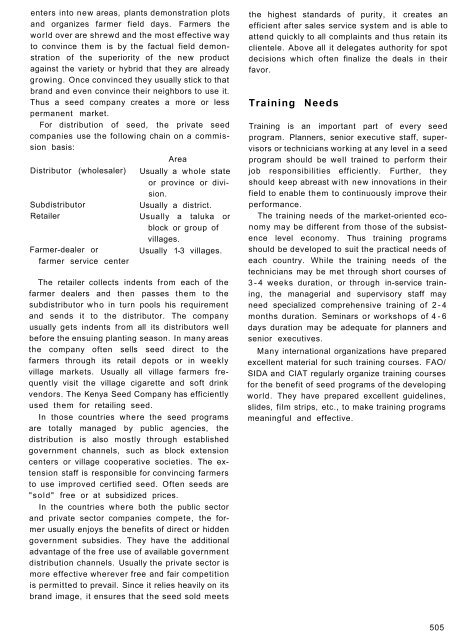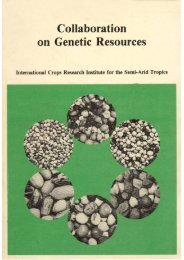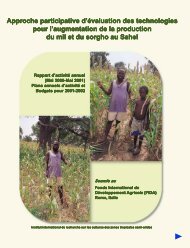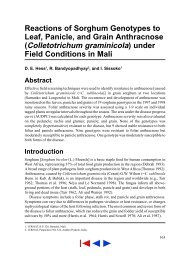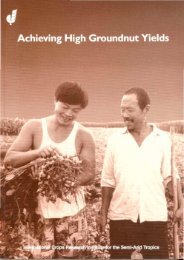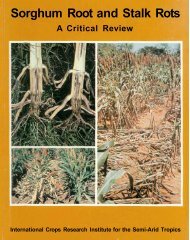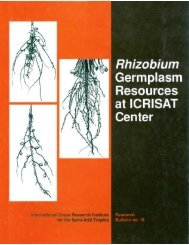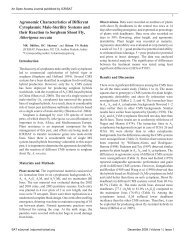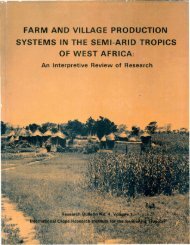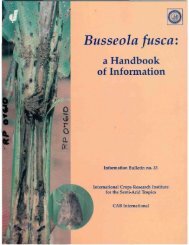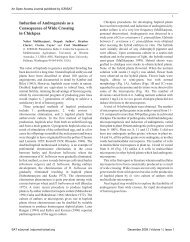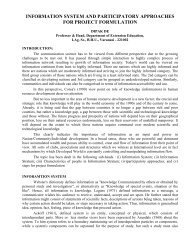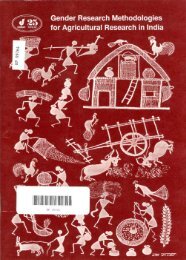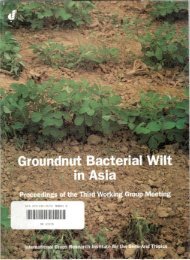RA 00048.pdf - OAR@ICRISAT
RA 00048.pdf - OAR@ICRISAT
RA 00048.pdf - OAR@ICRISAT
Create successful ePaper yourself
Turn your PDF publications into a flip-book with our unique Google optimized e-Paper software.
enters into new areas, plants demonstration plots<br />
and organizes farmer field days. Farmers the<br />
world over are shrewd and the most effective way<br />
to convince them is by the factual field demonstration<br />
of the superiority of the new product<br />
against the variety or hybrid that they are already<br />
growing. Once convinced they usually stick to that<br />
brand and even convince their neighbors to use it.<br />
Thus a seed company creates a more or less<br />
permanent market.<br />
For distribution of seed, the private seed<br />
companies use the following chain on a commission<br />
basis:<br />
Distributor (wholesaler)<br />
Subdistributor<br />
Retailer<br />
Farmer-dealer or<br />
farmer service center<br />
Area<br />
Usually a whole state<br />
or province or division.<br />
Usually a district.<br />
Usually a taluka or<br />
block or group of<br />
villages.<br />
Usually 1-3 villages.<br />
The retailer collects indents from each of the<br />
farmer dealers and then passes them to the<br />
subdistributor who in turn pools his requirement<br />
and sends it to the distributor. The company<br />
usually gets indents from all its distributors well<br />
before the ensuing planting season. In many areas<br />
the company often sells seed direct to the<br />
farmers through its retail depots or in weekly<br />
village markets. Usually all village farmers frequently<br />
visit the village cigarette and soft drink<br />
vendors. The Kenya Seed Company has efficiently<br />
used them for retailing seed.<br />
In those countries where the seed programs<br />
are totally managed by public agencies, the<br />
distribution is also mostly through established<br />
government channels, such as block extension<br />
centers or village cooperative societies. The extension<br />
staff is responsible for convincing farmers<br />
to use improved certified seed. Often seeds are<br />
"sold" free or at subsidized prices.<br />
In the countries where both the public sector<br />
and private sector companies compete, the former<br />
usually enjoys the benefits of direct or hidden<br />
government subsidies. They have the additional<br />
advantage of the free use of available government<br />
distribution channels. Usually the private sector is<br />
more effective wherever free and fair competition<br />
is permitted to prevail. Since it relies heavily on its<br />
brand image, it ensures that the seed sold meets<br />
the highest standards of purity, it creates an<br />
efficient after sales service system and is able to<br />
attend quickly to all complaints and thus retain its<br />
clientele. Above all it delegates authority for spot<br />
decisions which often finalize the deals in their<br />
favor.<br />
Training Needs<br />
Training is an important part of every seed<br />
program. Planners, senior executive staff, supervisors<br />
or technicians working at any level in a seed<br />
program should be well trained to perform their<br />
job responsibilities efficiently. Further, they<br />
should keep abreast with new innovations in their<br />
field to enable them to continuously improve their<br />
performance.<br />
The training needs of the market-oriented economy<br />
may be different from those of the subsistence<br />
level economy. Thus training programs<br />
should be developed to suit the practical needs of<br />
each country. While the training needs of the<br />
technicians may be met through short courses of<br />
3 - 4 weeks duration, or through in-service training,<br />
the managerial and supervisory staff may<br />
need specialized comprehensive training of 2 - 4<br />
months duration. Seminars or workshops of 4 - 6<br />
days duration may be adequate for planners and<br />
senior executives.<br />
Many international organizations have prepared<br />
excellent material for such training courses. FAO/<br />
SIDA and CIAT regularly organize training courses<br />
for the benefit of seed programs of the developing<br />
world. They have prepared excellent guidelines,<br />
slides, film strips, etc., to make training programs<br />
meaningful and effective.<br />
505


